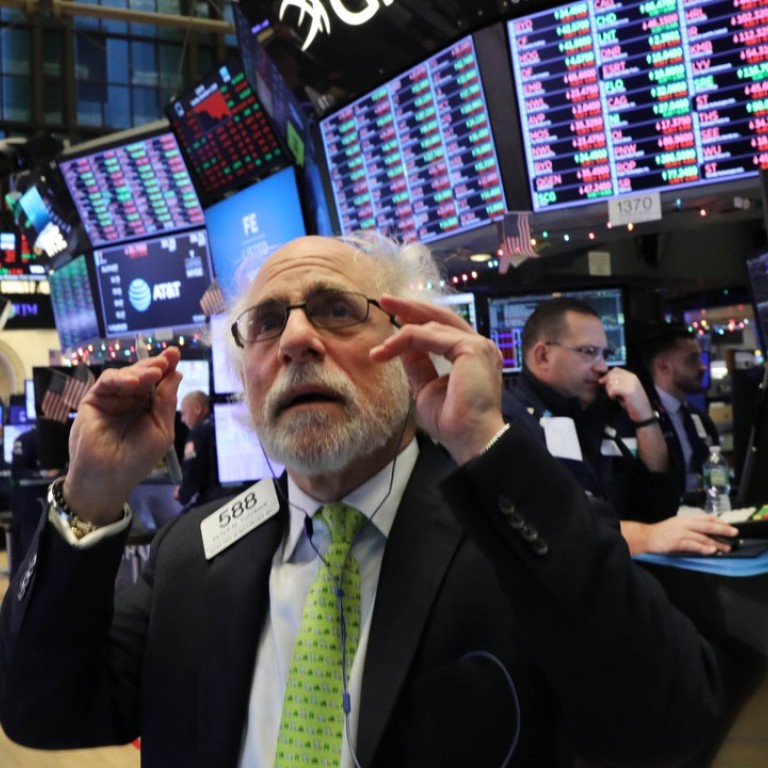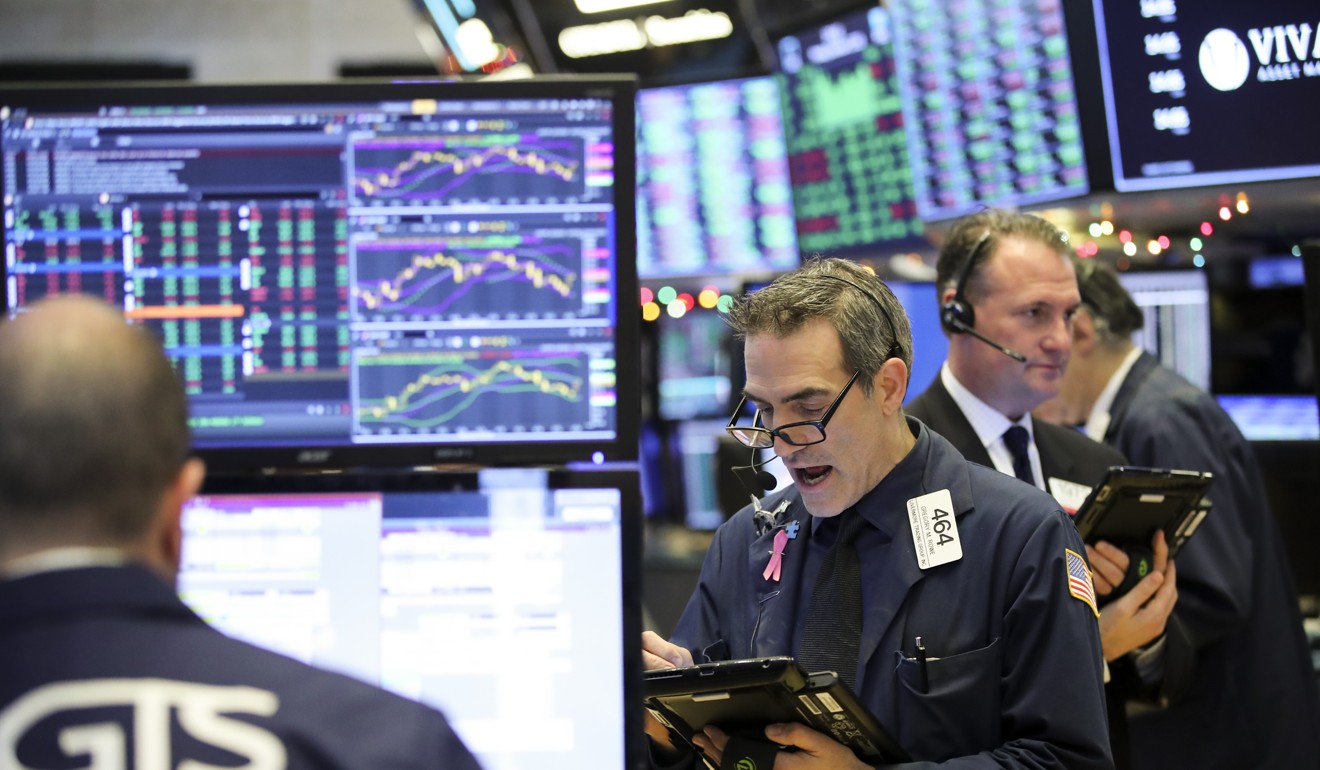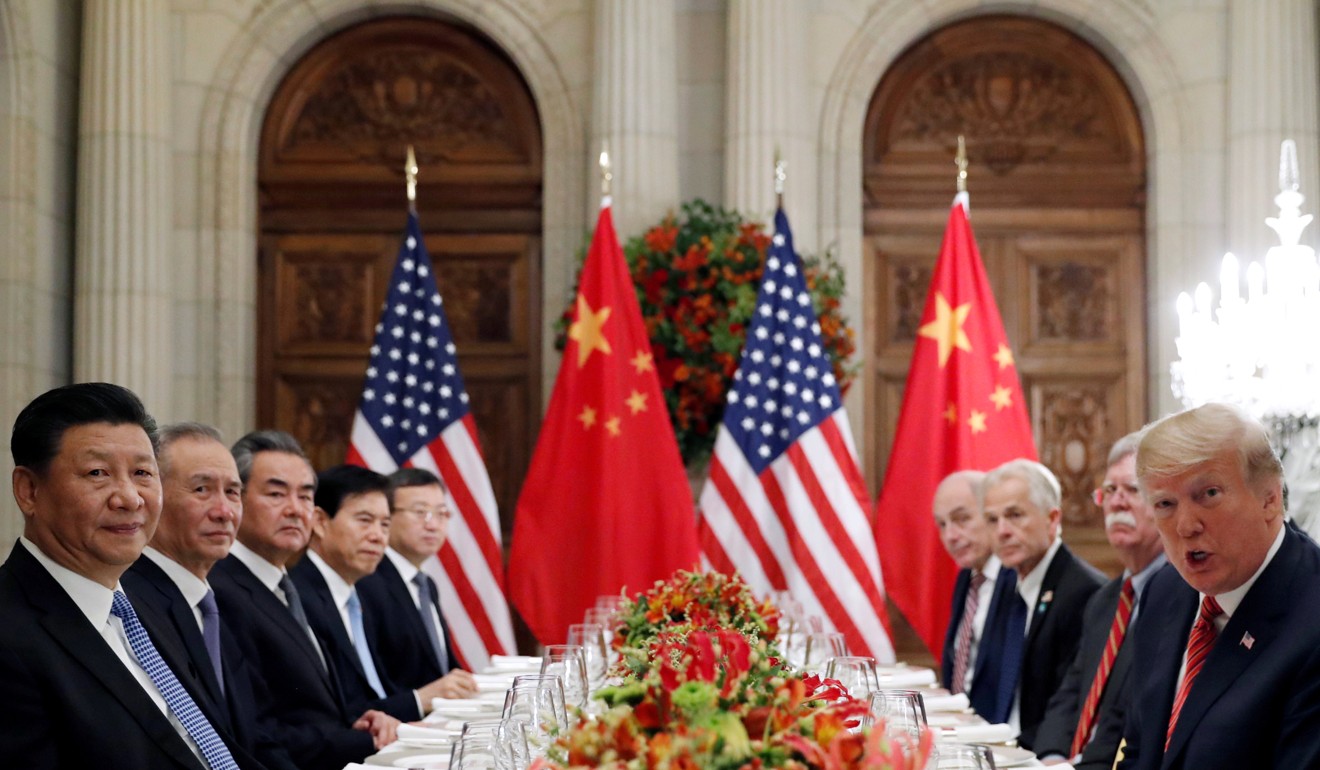
US stocks plunge as details of Donald Trump-Xi Jinping meeting fail to assuage investors on trade war
- ‘Narrow agreements and modest concessions in their ongoing trade dispute will not bridge the wide gulf,’ analysts said
- All eyes were on US Treasury rates as a so-called inversion pointed to a downturn
US stock markets plummeted on Tuesday as results of a weekend meeting between President Donald Trump and Chinese President Xi Jinping failed to convince investors that the trade war ceasefire was a true reprieve and as a key recession indicator kicked in.
The losses on Wall Street accelerated after investors dissected the nuances of the talks on Saturday in Buenos Aires announced by the Trump administration and China, reflecting worries that the initial read on a potential trade deal was overly optimistic.
The Dow Jones Industrial Average plummeted nearly 800 points, or 3.1 per cent, to 25,027.
The S&P 500 was down more than 90 points, and the Nasdaq Composite Index slumped nearly 4 per cent, or 283 points.

After an highly anticipated dinner Saturday in Argentina on the heels of the Group of 20 summit, Trump said his meeting with Xi went “very well”. Details emerged from the US side that China was willing to slash its auto tariffs on American cars and promised to buy up to US$1.2 trillion in US goods and services. The markets rejoiced on Monday.
The enthusiasm didn’t last long. Throughout Monday, conflicting comments made by Trump and his senior advisers confused investors. On Tuesday morning, Trump walked back his applause and renewed his stance on being tough on trade.
In a threatening tweet, he said: “When people or countries come in to raid the great wealth of our Nation, I want them to pay for the privilege of doing so.”
Markets be wary: the Xi-Trump truce may not end the trade war
Analysts reacted negatively to Tuesday’s messages.
“We expect US-China relations to remain contentious,” Atsi Sheth, managing director at Moody's Investors Service, said in a note. “Narrow agreements and modest concessions in their ongoing trade dispute will not bridge the wide gulf between their respective economic, political and strategic interests.”
Analysts at Bank of America said on Tuesday that the meeting between the two leaders “didn’t change our view on how the trade tension affects US stock markets and economic growth”.
The financial services firm continued to peg this tension as the one of the “big wild card risks in 2019.”
‘Tariff Man’ Donald Trump says China trade war talks will end in March – unless they don’t
Also pressuring the market on Tuesday was the Treasury yield curve, a key recession indicator, which moved in a direction that indicates a downturn.
On Monday, a portion of the so-called yield curve inverted, a phenomenon characterised by short-term rates exceeding long-term rates, indicating that investors are fleeing near-term bonds in fears of an economic slowdown. As of Tuesday morning, the yield on the benchmark two-year Treasury note exceeded the yield on the five-year note.
“The recent inversion of the US Treasury yield curve is a signal that the economy is set to weaken,” said Jeffrey Gundlach, CEO of the investment firm DoubleLine.
Analysts at Bank of America also expressed concern about the yield curve inversion. “Market is more focused on what Fed is going to do with the rates,” they said in a call on Tuesday.
The recession concerns pushed the banking sector down, with J.P. Morgan Chase shedding 3.1 per cent, Bank of America losing 4.9 per cent and Citigroup 4.2 per cent.
As overall economic growth slows in the US and a bearish sentiment in the stock markets set in for the last month of the year, markets jubilance evaporated after investors realised that although the meeting between Trump and Xi resulted in a temporary relief in the trade war, the two sides remained far apart on a number of crucial issues.

In the next 90 days, negotiations will focus on China’s forced technology transfers from the US companies, loose intellectual property protection, non-tariff barriers, cyber intrusions and cyber theft among others.
The US will also likely pressure Beijing to cease its “Made in China 2025” programme, a national industrial policy crucial to making China dominant in global technology.
“China’s willingness to agree to any meaningful concessions concerning these broad economic issues remains far from certain, based on the several rounds of unsuccessful talks between US and Chinese officials during much of 2018,” said Nelson Dong, who heads the national security group at the law firm of Dorsey & Whitney.

